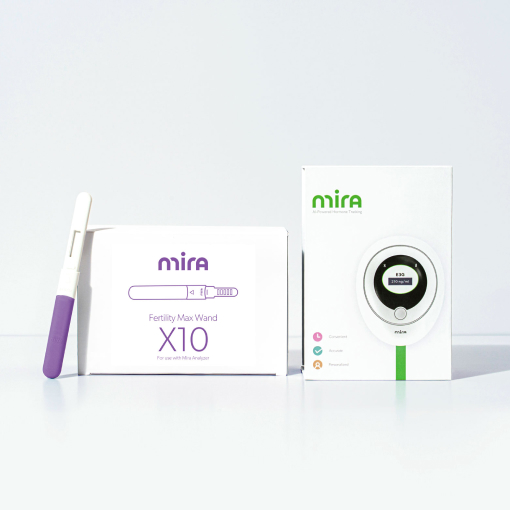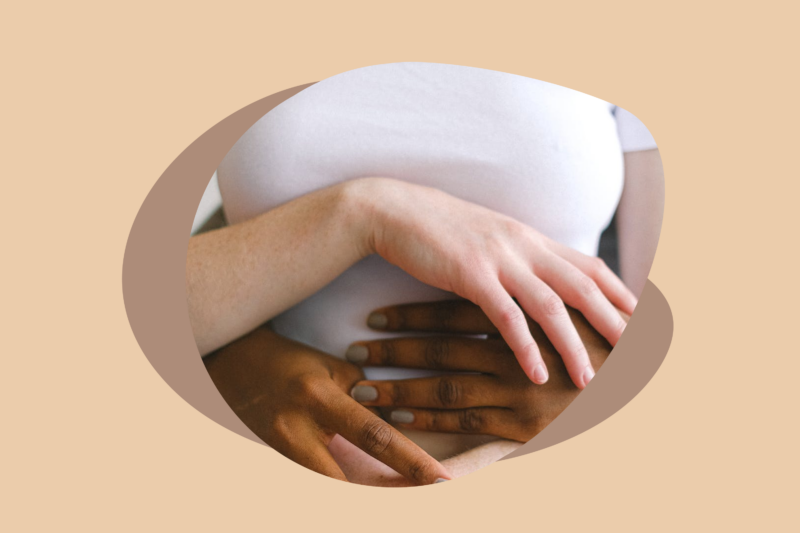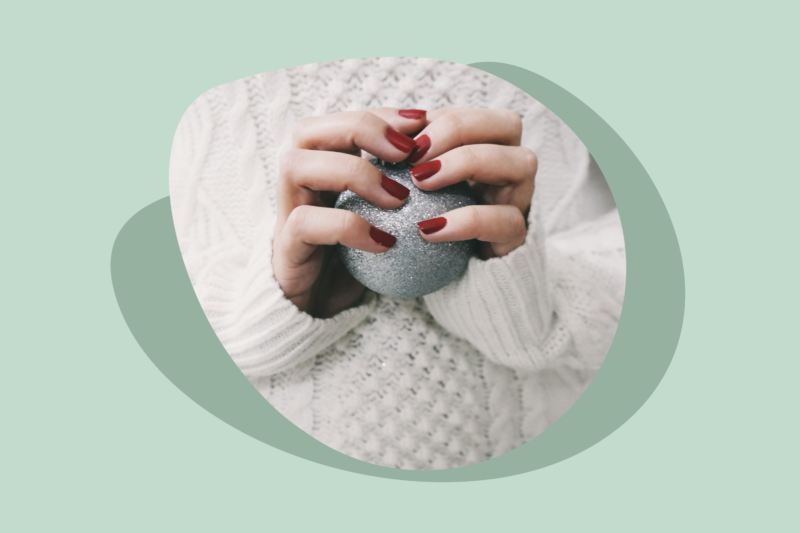What to Do After Sex When TTC? Peeing, Laying Down, and Other Tips
When we were young, we were taught that getting pregnant was an easy task. All you had to do was have unprotected sex, and suddenly you would become pregnant! (Cue years of fear of unwanted pregnancy.)

But when you begin trying to conceive (TTC), you realize that conceiving a baby is much harder than you thought when you were young. Unfortunately, getting pregnant isn’t always as simple as getting down with your partner – there are many moving parts to think about! For example, as you probably already know, you need to time sex with your fertile window in order to get pregnant.
You’ve probably done a lot of research (and found a lot of conflicting opinions) about what to do before and during sex to help your pregnancy chances. You may also be wondering what to do after you’ve finished doing the deed. Maybe you heard an old wives’ tale that holding your legs up after sex will help you get pregnant, or you’re wondering if peeing after sex will kill your partner’s sperm.
Sadly, we aren’t taught much about how fertility works in school and your questions may have gone unanswered for months or even years. If you’re wondering what to do after sex when TTC, look no further: read on to discover which tips work according to science — and which pieces of wisdom may be more fiction than fact.
After Sex TTC Tips
We’ve already answered a few questions like how often to have sex or what sex positions to use in order to get pregnant. In this blog post, we’ll be focusing on what to do after sex.
Read on as we explore some of the myths you may have heard about peeing, laying down, and using a menstrual cup to help your chances of conceiving.
Should I pee after sex if trying to get pregnant?
Many medical experts recommend peeing after sex to prevent urinary tract infections (UTIs). Others, however, say you should stay laying down for at least five minutes after sex when TTC to increase the odds of sperm fertilizing an egg.
So, will getting up to go pee hurt your chances of getting pregnant? Probably not. Pee comes from a tube called the urethra, which is connected to the bladder. Because sperm is ejaculated into the vagina during sex, not the urethra, peeing will not flush sperm out of the vagina.
Will peeing after sex kill the sperm?
No, peeing after sex will not kill the sperm. According to Planned Parenthood, urinating after sex does not kill sperm and will not prevent you from getting pregnant. So, if you’re TTC and dying to pee after having sex, feel free to get up and go!
Why should you pee after sex?
Peeing after sex won’t hurt your chances of getting pregnant — and may even boast some health benefits like preventing UTIs.
For example, when bacteria get trapped in the urethra (the tube that connects your bladder to the urethral opening, where pee comes out), it can travel to the bladder and cause painful infections in the urinary tract. The urinary tract includes the bladder, urethra, and kidneys, and UTIs can be dangerous if left untreated in these areas.
It’s important to note that while peeing after sex does help flush bacteria out of the urethra after sex, it will not prevent you from contracting a sexually transmitted infection (STI). To prevent STIs, you will need to use a barrier method, such as a condom. However, if you are trying to get pregnant, you have to have unprotected sex. So, if your partner has an active STI, you should refrain from TTC until they are treated.
4 TTC Myths Explained
Does holding your legs up help you get pregnant?
You’ve probably seen it onscreen in television shows like Bridgerton: when a woman is trying to get pregnant, she lays down and holds her legs up in the air after sex to encourage conception. The idea is that the position facilitates the travel of sperm into the fallopian tubes to fertilize an egg. This tip has been around for centuries — but will it actually help you get pregnant?
Despite what your grandmother may have told you, there is no evidence that laying down after sex, either flat on your back or with your legs up in the air, will improve your odds of conception. According to the University of Southern California, sperm moves through the fallopian tubes so quickly (in under two minutes!) that your body’s position after sex does not matter.
How long should you lay down after sex?
There is no scientific evidence that laying down after sex will help you get pregnant. That being said, there are no risks associated with laying down after sex, so there is no harm in trying it! Anecdotally, some say that laying down for at least 15 minutes after sex prevents gravity from pulling sperm away from the cervix.
Can a menstrual cup help keep sperm in after sex?
Menstrual cups have become popular as an eco-friendly alternative to pads and tampons. However, some women are also using them as a DIY fertility solution. They may insert a menstrual cup filled with ejaculate or insert a menstrual cup after sex to prevent ejaculate from exiting the cervix. So, is this tip legit?
There aren’t any studies showing that using a menstrual cup after sex increases your odds of pregnancy. That being said, studies show that less than 1% of a man’s sperm stays in the reproductive tract after sex. It may only take one sperm to fertilize an egg, but it also reasons that increasing the amount of sperm at the cervical opening could improve the odds of that single sperm making it.
Because menstrual cups are affordable and safe, some women’s fertility experts encourage their use after sex to keep sperm at the cervical opening, especially before trying more expensive fertility treatments. As long as you follow the general guidelines for use — a menstrual cup can be safely worn for up to 12 hours — it may be worth a shot!
Can an orgasm increase the chance of pregnancy?
The orgasm gap is real — less than half of women always or nearly always have an orgasm during sexual intercourse, compared with more than 90% of men. All women deserve to have an orgasm during sex, but is it necessary for pregnancy? The answer is a strong “maybe.”
If you have trouble reaching the finish line, don’t worry: conception is definitely still possible without an orgasm. While some experts believe the uterine contractions that occur during the female orgasm help propel sperm into the fallopian tubes, studies have not been able to consistently replicate these findings.
That being said, science does show that orgasms (besides being pleasurable) may play a functional role in helping you get pregnant — just not in the way we thought. Having an orgasm results in the release of a feel-good chemical called oxytocin, which may slightly improve the odds of conception.
Studies show that when oxytocin is administered, women retain more sperm. However, the amount of oxytocin administered in the study was up to sixty times higher than the amount released during orgasm, so it’s unclear just how pronounced this effect could be in real life.

Is there any food or vitamins that can boost fertility?
While there isn’t a magic potion you can consume immediately after intercourse to guarantee success, making certain dietary choices and incorporating fertility-friendly supplements into your routine may significantly enhance your chances of conceiving.
Fertility-Friendly Foods
Eating a balanced diet that includes fertility-friendly foods can positively impact your reproductive health. Consider incorporating nutrient-rich options like leafy greens, fruits, whole grains, and lean proteins into your meals. For a comprehensive guide on fertility-boosting foods, check out our TTC Menu Freebie.
Supplements
Taking certain vitamins and supplements may support your fertility journey. We offer Prenatal Multi-Vitamins formulated to provide the necessary nutrients to optimize reproductive health. Be sure to consult with your healthcare provider before introducing any new supplements into your routine.
FAQs
Why am I peeing a lot after sex?
It’s common to experience some pressure in your bladder after having sex, resulting in the need to pee. In an interview with Bustle, one OBGYN explains that this “pressure” or urge to urinate could be caused by a number of factors, including increased blood flow in the urinary tract and contractions/spasms in the bladder and uterus.
If you find yourself having the urge to pee a lot in the days following sex, this is a tell-tale sign of a UTI. Sometimes a UTI can go away on its own. However, if the frequent urge to urinate persists and is accompanied by pain, fever, and/or chills, seek help from a doctor immediately to avoid complications.
What should I do if I experience pain while peeing after sex?
Sometimes sexual intercourse can cause the urethra to become irritated, making urination after sex a bit painful but not necessarily a cause for concern.
However, painful urination after sex is also a common symptom of both UTIs and STIs. So if the symptom persists in the days following sex, it’s a good idea to seek advice from a doctor for further testing and treatment.
What are some common symptoms of a urinary tract infection?
According to The Mayo Clinic, The most common symptoms of a urinary tract infection (UTI) include:
- Strong, frequent urges to urinate (sometimes passing very little urine)
- Burning sensation while urinating
- Urine that is cloudy and/or red, pink, or brown in appearance
- Urine with a strong odor
- Pelvic pain
It’s important to note here that if left untreated, UTIs can cause serious complications including repeated infections, permanent kidney damage, and sepsis. If you suspect that you have a UTI that will not resolve, seek advice from your healthcare provider immediately.
Why does it burn when I pee after sex?
A burning sensation while peeing after sex is another sign that your urethra may simply be agitated from intercourse. If the burning sensation persists, this could be a symptom of either a UTI or STI and you should seek advice from your doctor.
Is there an exact time period for when I should pee after sex?
Again, there is no scientific evidence that peeing after sex will prevent UTIs. But, anecdotally, some women say that peeing within 30 minutes of having sex is helpful, and the sooner you pee after sex the better.
Recommended for you
Navigate your fertility with peace of mind
Mira’s Editorial Process
All content produced by Mira meets stringent editorial standards, ensuring excellence and accuracy in language and medical precision. Every piece undergoes thorough fact-checking and review by qualified professionals. Check out our full editorial process to learn more.














